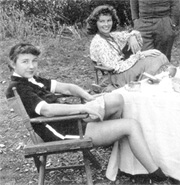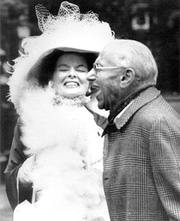Kate continued 2

In 1930, Hepburn fell in love with Laura Harding. Can you tell me a little bit about that relationship?
Some people said she was the great love of her life, that she was the one who was always there when Kate needed her. She was the one that Kate seemed to turn to in times of crisis. And who always came through, who never, never let her down.
I think in the beginning Laura and Kate assumed that they could live a rather unorthodox sophisticated relationship in Hollywood, because that’s the way they had been living in New York. Hollywood was very open and tolerant of same-sex couples at that time. But when the time came when it looked like Laura perhaps was standing in Kate’s way of really making it in Hollywood—the rumors were just a little bit too frequent—Laura was sent back to the east coast. It broke Laura’s heart. I read her letters, and it’s very obvious that she was heartbroken to have to leave Kate. She also understood and didn’t hold it against her.
And yet they did stay in contact, right?
Oh, yes, all through their life. Even though Kate would fall in love with other men and have relationships with other women, Laura was always there somewhere in the background.
In 1981, Hepburn told Barbara Walters, “I put on pants 50 years ago and declared a sort of middle road.” What do you think she meant by that?
I take her at her word. Whether she was consciously trying to tell us that she was walking in between the genders, so to speak, I don’t know. She was certainly never introspective. She didn’t give a lot of thought as to who or what she was, but she lived her life as she saw fit. It’s as if she lived her life in a way that was natural to her. And living that as a woman was never quite fit for her. She never fit into conventional womanhood, and certainly because of her body, she didn’t live as a man. So she kind of did live this middle road. With Spencer Tracy she could play the doting wife, but with Phyllis Wilbourn, her longtime companion, and with her gay male friends, she could be the dominant male. So she did forge this middle path.
In that aspect, she was herself.
That’s why I don’t put any label on her, because she was herself. She chose her own way, her own path, and had her own relationships that were defined by her own idiosyncrasies. To say that she was lesbian or bisexual or transgender or heterosexual or whatever…none of those fit, because she was so individual.
If she was who she was today, would a label be easier?
Well, it depends. And I suppose I have thought of that. What if she was born in 1977 or 1987 rather than 1907? I think given who she was, and if identity is really that intrinsic and really that part of her essential self and not formed by her environment, then she perhaps would have identified with one or more of those labels.
Or it’s possible too that she was completely a creature of her own environment and her own times and that she was who she was because of how her parents were, which were rebels in the early 20th century. Perhaps they wouldn’t have been rebels in the later part of the century. It’s so speculative, you can’t say. But if in fact identity characteristics like that are essential, then I think perhaps she might have gone for one of those labels—gay, lesbian, transsexual, or bisexual. Who knows, but it is interesting to think about it.
It really is. She’s just so fascinating. And after reading the book, I like her even more.
That’s great. I’m glad to hear that. Some people thought that in telling her full story, with all of the contradictions and complexities to it, that people would like her less somehow, or that somehow the legend would be demeaned, when in fact I think the real woman in all of her complexities is far more fascinating than the legend.
Does the fact that you’re gay imply you have “a gay agenda”?
There have been those people—you’ll see them online and they pop up now and then on Amazon—to say that I’m just merely part of the gay agenda or something like that, that I need to claim all of these heterosexuals for our own or something like that. I think the real story though is that the book has sold very well. I’m very pleased with the response. It’s been selling very well, and certainly that’s not been all gay people buying the book.
The reviews have not been written by gay people, and they seem to have really thought that what I presented was an honest and accurate portrayal. I think we have finally, thankfully, moved into a time and era where we can understand a person’s full humanity without letting the sexuality become a blinding light so that we can’t see anything else because of the sexuality. I had to focus on Kate’s sexuality. I had to bring that forward, because it’s part of who she was and it certainly hadn’t been covered in previous books. And I’m pleased that most people seem to have said, “Well, that was an important aspect of who she was, and it’s not going to color my perception of the whole picture of her life.”

George Cukor was her best friend. What do you think kept their relationship so lasting?
He had found her. He had discovered her. He had nurtured her into her first screen success, and he was the kind of man she adored. He was smart. He was witty. He threw great parties. He respected the complexity of her own life without ever needing to put a definition on her. And that’s what she needed. She wasn’t like Dietrich or someone who you could throw out the word lesbian and they’d love it, the camp of it. Hepburn would have reacted to that: “Ah, you know that’s not me. I’m who I am.” Cukor accepted who she was. He honored the relationship with Tracy. He honored the relationship with Laura. So he was someone who always kind of got her. He understood her.
Other than Laura Harding, who were Hepburn’s most important female relationships?
One of the things that’s important about Hepburn, whether it’s talking about her male or female relationships, sex was not necessarily a big determinant for them. Tracy was really a very, very important figure in her life. I don’t think sex was much of a factor in that relationship after the first year or two. But that shouldn’t minimize the relationship either.
Talking about other women in her life…these relationships might not have been sexual. For example, Irene Selznick—that was no sexual relationship, and yet Irene was such a grounding for Kate in the ’50s, especially when Kate was estranged from Tracy. So she turned to Irene and they had a very deep, very close, close bond, and they spent all their time together, but it was not a sexual relationship. Kate didn’t like sex. Whether it was with men or women, she just didn’t like it very much.
There were other women in her life. She had what seems like a lovely sojourn with the journalist Patricia Jared in Australia. There were some very affectionate letters back and forth. Maybe that was sexual, maybe it was just a deep friendship. People thought it was probably sexual, but who knows at this point? None of us were under the bed.
She had a long friendship with her stand-in Eve March, and Eve was always around. Then certainly at the end of her life there was Cynthia McFadden, who was much, much younger than Kate, but to whom Kate was devoted and who was devoted to Kate. Cynthia [who is now co-anchor for both Nightline and Primetime Live ] really made sure that the last years of Kate’s life were more comfortable and that Kate was well-cared for and surrounded by the best people.
And how can I forget Phyllis Wilbourn, who was with Kate for longer than anybody as her companion. It was not sexual, but it was a deep, deep bond. They were like a married couple.
Throughout the book, you mention that people said how badly Hepburn treated Wilbourn. I think one person even said that she treated her like a dog. But when they were both a lot older, there was one passage in the book where Phyllis was getting out of a chair, and she fell, and Hepburn jumped to her feet to help her.
Roles were reversed for a while at the end. Phyllis was declining very rapidly, and Kate would end up helping Phyllis around, where Phyllis of course had always done that for so many years. But they were devoted. I think Kate loved her perhaps as much as she loved anyone in her life.
Speaking of love, and since this is for our Valentine’s Day issue, I specifically wanted to get into the love story between Hepburn and Spencer Tracy. I know it’s kind of complicated, but can you summarize that relationship?
It was a devoted, passionate, complicated, and always loving relationship. That didn’t mean that Tracy didn’t treat Kate terribly sometimes….











Comments